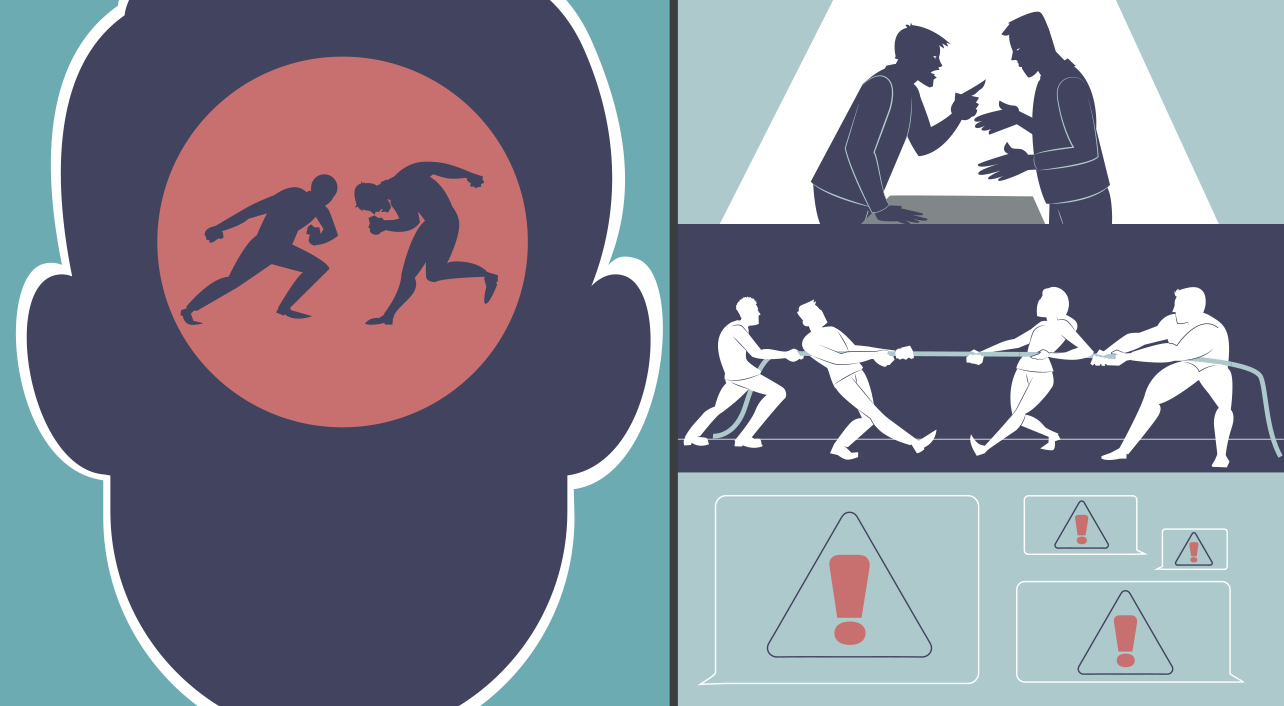- leadership
- Blog post
Surprising research about employee engagement and conflict
When you think about conflict in the workplace, you probably imagine personality clashes, turf battles, maybe complaints of maltreatment or harassment. You see bad outcomes like lower productivity, absenteeism, turnover or even legal trouble.
So if somebody told you that conflict can boost employee engagement, you might dismiss the suggestion. Surely conflict among coworkers harms engagement. People get turned off and tune out!
Fact is, however, that the right kind of conflict actually enhances engagement, according to research done by a team of sociologists at the University of Minnesota’s Cooperative Learning Institute. And by the same token, a lack of creative conflict can undermine employee engagement.
‘Constructive controversy’
The Minnesota researchers conducted a series of laboratory and field experiments on what they called “constructive controversy,” defined as organized conflict in small groups over ideas.
The researchers aggregated their results, and found that participants enjoyed tasks more, and felt more involved, when there was constructive disagreement over how to accomplish them, as opposed to ordinary discussion. Here’s how the researchers summed it up: “Creating knowledge through disagreement tends to arouse emotions and increase involvement… participating in a controversy consistently promoted more positive attitudes toward the experience.”
Think about it: What’s more boring than a discussion where nobody objects, says anything counterintuitive, or deviates from the conventional wisdom? By contrast, when somebody interjects and says, “But what about this?” people snap to attention. There’s a sense of interesting friction, of intellectual and emotional arousal. Engagement surges. People want to take part.
When there’s no conflict over ideas in a team or a department, high-potential employees feel they’re not being challenged. They feel the leader is accepting mediocrity, and they look for something better – in the organization or outside.
Keep it positive
So are we saying that leaders should foster conflict? Yes, as long as it remains positive and stays focused on ideas, not personalities. And just how should a manager do that? Stand up in a meeting and order everybody to start arguing? Of course not.
Here’s what you can do. First, take opportunities to assert that high performance is a core value of your team, and creative conflict is part of high performance. Let people know you expect and will reward constructive disagreement.
Second, model the way by becoming a dissenter yourself. Every so often, call into question the way you and/or the team have been doing things. Research shows that when people are exposed to dissent, they’re far more likely to engage in disagreement themselves.
5 rules
Fostering engagement through conflict can be tricky. So the Minnesota researchers developed rules for keeping conflict constructive. Here are five to consider:
- Be critical of ideas, not people. Don’t let discussions veer off into character assassination.
- Separate your personal worth from criticism of your ideas. Just because your idea may not hold water doesn’t mean you’re a failure.
- Remember that the whole team is in it together. It’s not about scoring points off each other – it’s about scoring points for each other.
- Encourage everyone to participate. It’s nice to engage one or two people, but better to engage the whole team.
- Listen to everyone’s ideas, even if you don’t agree. People can’t become engaged if they don’t have a full opportunity to be heard.
This blog entry is adapted from the Rapid Learning module “Employee Engagement and the Surprising Power of Conflict.” If you’re a Rapid Learning customer, you can watch the video here. If you’re not, but would like to see this video (or any of our other programs), request a demo, and we’ll get you access.
The blog post and Rapid Learning video module are based on the following research study:
Johnson, D. et al (2000) Constructive controversy: The value of intellectual opposition. In M. Deutsch & P.T. Coleman (Eds.), The handbook of conflict resolution: Theory and practice, 65-83, Jossey-Bass/Wiley

Get a demo of all our training features
Connect with an expert for a one-on-one demonstration of how BTS Total Access can help develop your team.




